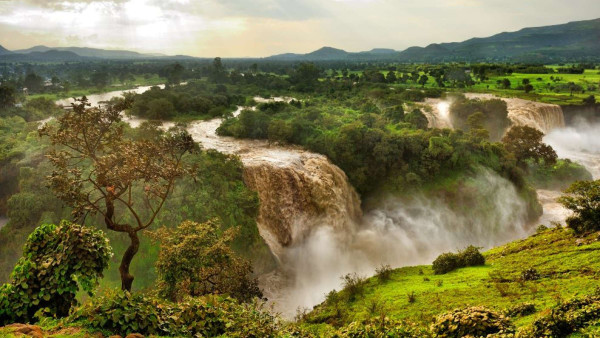Ethiopia is severely affected by climate related hazards. Since 2020, the country has faced prolonged drought resulting from consecutive failed rainy seasons, generally happening in the northern, southeastern, and southern parts of Ethiopia. The current drought impacts approximately 24 million people, including more than 11 million people who are in need of food assistance. The majority being in Afar, Oromia, Southern Nations, Nationalities and Peoples’ (SNNP), and Somali regions (WFP, OCHA, 2023).
Authorities have reported at least 57 fatalities due to flooding and landslides, with more than 1.5 million people affected and over 600,000 displaced across seven of the country's twelve regions. These recurrent shocks underscore the need for greater investments in Ethiopia’s early warning, prevention and risk reduction systems to avoid and minimize impacts on people, their assets, social services and critical infrastructure.
As one of the 30 particularly at-risk countries identified by the Early Warnings for All (EW4All) Initiative, Ethiopia is putting into action its Roadmap for Multi-hazard, Impact-based Early Warning and Early Action System (2023-2030).
The Disaster Risk Management Commission (EDRMC), in cooperation with UNDRR and the United Nations Country Team in Ethiopia, gathered over 60 technical experts from across 25 organizations and 12 regions to chart the next phase of Roadmap implementation, exploring how better use of risk data can further strengthen national, sub-national and community-based early warning systems.
In his opening remarks, the EDRMC Commissioner, H.E. Ambassador Shiferaw Teklemariam, underscored:
“As the first country to convene a risk knowledge technical workshop under the auspices of EW4All, and as one of the most vulnerable countries to the climate crisis, we recognize the tremendous benefits to be gained by better applying risk data in our early warning systems. Ethiopia generates a tremendous volume of hazard, vulnerability and loss and damage information from across the country; our challenge is leveraging this wealth of risk knowledge to improve how we deliver early warning systems to those most at risk”.
EDRMC and its partners have made impressive strides in mapping exposed areas and populations vulnerable to climate-related hazards. Risk-information can be further improved through a risk information management system. This system would be a basis for the operationalization of a situation room, linked to Emergency Coordination Centres-ECC (both at national and regional levels). It will ensure better access to and use of near- and real-time risk data, as part of efforts to strengthen preparedness and early action during a crisis. Promoting open access and sharing of risk data and analyses across multiple sectors, including by scaling up digital automation, is a key priority for national and regional authorities.
Participants reviewed insights from previous investments in community-based disaster risk profiles and explored together opportunities to improve existing practices in disaster risk profiling. They pointed to digitalization to enable more frequent updating, ease of access and expanding the use of the profile in the face of dynamic climate and disaster risks.
In the presence of Microsoft, a member of the EW4All advisory group, the workshop also acknowledged the role of the private sector, as well as digital innovation, in supporting the implementation of EW4All. The company was represented by its Artificial Intelligence for Good team. They stressed the opportunities to leverage the computing powers of Big Techs and the Artificial Intelligence innovation, especially in exposure mapping, in partnership with UNDRR, EDRMC, Planet and Ethiopia’s Artificial Intelligence Institute.
In closing the technical workshop, the Commissioner noted:
“We thank UNDRR for its collaborative spirit in bringing so many actors together to assist with Roadmap implementation in 2024 and beyond, and for its expertise in identifying options to improve the integration of risk knowledge under the change pathways we’ve plotted under our Roadmap.”
This workshop was made possible thanks to the financial support of the German Federal Foreign Office - Federal Foreign Office (GFFO), under the project “Sendai Framework Implementation: Accelerating Disaster Risk Reduction in Humanitarian Action” project.
Distributed by APO Group on behalf of United Nations Office for Disaster Risk Reduction (UNDRR).
Latest Stories
-
Joy FM’s Party in the Park: A day of family fun awaits in Aburi
13 seconds -
Mahama urged to stand firm against lobbyists in appointments
9 minutes -
SEED Academy Ghana to hold elite Basketball Camp and Leadership Summit on December 26
15 minutes -
Kofi Asare criticises delays in Free SHS and WASSCE funding
19 minutes -
KNUST Medical School targets expansion of teaching facilities to accommodate more students
21 minutes -
WAFU B U-17 Girls Cup: Black Maidens duo pick up top awards in inaugral edition
32 minutes -
International Day for PWDs: Telecel Ghana Foundation trains deaf students in robotics
33 minutes -
Kasia Coal releases holiday anthem ‘Feliz Navidad’
54 minutes -
American Airlines grounds all US flights on busy Christmas Eve
1 hour -
UNICEF urges Ghana to prioritise TVET investment to address youth unemployment
1 hour -
Businessman to plead guilty in NY Mayor Adams’ corruption case
1 hour -
Black Sherif stamps authority with aura as high as his shoulder pads at ‘Zaama Disco’ concert
1 hour -
Let go AFCON qualification woes and back Black Stars in World Cup qualifiers – Joseph Paintsil
1 hour -
The US town where it’s the law to own a gun
1 hour -
We must maintain the credibility of our electoral system – Dr. Bossman Asare
2 hours

